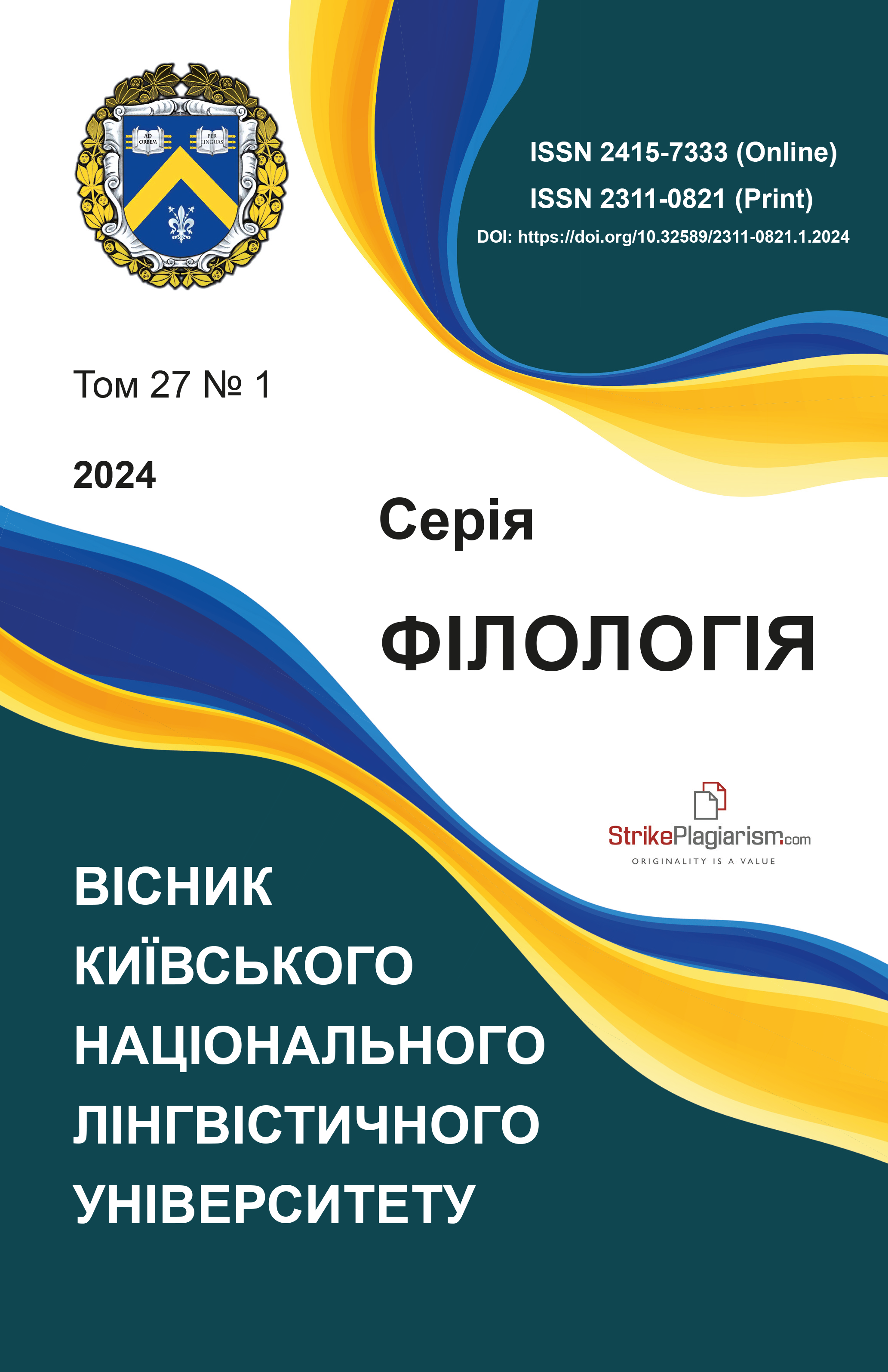Концепт 战争 / ВІЙНА як слот фреймових структур у китайськомовному медіадискурсі
DOI:
https://doi.org/10.32589/2311-0821.1.2024.309643Ключові слова:
концепт, війна, фрейм, медіа, дискурс, слот, китайська моваАнотація
У статті розглянуто фреймові структури, слотом яких є концепт 战争 / ВІЙНА в китайськомовному медіадискурсі. Україна перебуває в стані загрози вже тривалий час, тому дослідження цього концепту займає одне з центральних місць в українській науці, на відміну від китайської, що і слугувало мотивацією для його вивчення саме в китайських медіа як найбільш відкритого типу дискурсу, що обмінюється концептами з іншими дискурсами. У статті виділено типи базових фреймів (предметний, таксономічний, або гіпонімічний, асоціаційний або, іншими словами, концептуальна метафора), складником яких є концепт 战争 / ВІЙНА; категоризовано базові фрейми залежно від типу пропозиції між слотами; описано лінгвістичні одиниці китайського медіадискурсу, що репрезентують семантику фреймів, у яких бере участь концепт 战争 / ВІЙНА. Предметний фрейм представлений 战争即邪恶zhànzhēng jí xié’è – ВІЙНА – ЦЕ ЗЛО, де другий слот наділяє перший різко негативною оцінкою, є його базовим концептуальним доменом. Це виявляється за допомогою різних лексико-граматичних засобів: у негативній семантиці лексем-репрезентантів концепту 战 争 / ВІЙНА, а також їхніх комбінаторних властивостях. Виділено таксономічний (гіпонімічний) фрейм 战争即政治 zhànzhēng jí zhèngzhì – ВІЙНА – ЦЕ ПОЛІТИКА, де другий концепт виступає родовим стосовно видового першого. Крім того, другий концепт слугує засобом врегулювання війни, тобто слугує концептові 和平 hépíng / МИР. До третього типу фреймових структур (асоціаційних фреймів) належать такі фрейми: 战争即赌博 zhànzhēng jí dǔbó – ВІЙНА – ЦЕ ГРА, основною характеристикою якої є непередбачуваність; 战争即灾难 zhànzhēng jí zāinàn – ВІЙНА – ЦЕ СТИХІЯ, а саме вогонь, тому цей фрейм може бути конкретизовано до 战争即火焰 zhànzhēng jí huǒyàn – ВІЙНА – ЦЕ ВОГОНЬ; а також 战争即戏剧 zhànzhēng jí xìjù – ВІЙНА – ЦЕ ВИСТАВА.
Посилання
English, R. (2013). Modern War: A Very Short Introduction, Very Short Introductions.
Oxford: Oxford Academic.
Fedichev, O. Ye. (2023). Suchasnyj kytajs’komovnyj dyplomatychnyj dyskurs: strukturnosemantychnyj
ta linhvoprahmatychnyj aspekty. Thesis. Kyiv.
Martyniuk, A. P. (2011). Slovnyk osnovnykh terminiv kohnityvno-dyskursyvnoi linhvistyky.
Kharkiv: KhNU imeni V. N. Karazina.
Prykhodko, A. M. (2008). Kontsepty i kontseptosystemy v kohnityvno-dyskursyvnij
paradyhmi linhvistyky. Zaporizhzhia: Prem’ier.
Ungerer, F., & Schmid, H.-J. (2006). An Introduction to Cognitive Linguistics (2nd ed.).
London: Routledge.
Vilchynska T. P. (2017). Kontsept “vijna”: osoblyvosti movnoi ob’iektyvatsii u hazetnomu
teksti. Linhvistychni studii, 34, 110–114.
Vorobei, O., Akimova, A., & Akimova, A. (2021). Metaphorical Conceptualization of
WAR in Chinese Sports Discourse. PSYCHOLINGUISTICS, 29(2), 25–45.
Xu, W., & Taylor, J.R. (Eds.). (2021). The Routledge Handbook of Cognitive Linguistics.
Routledge. https://doi.org/10.4324/9781351034708
Yavorska, H. M. (2016). Kontsept “vijna”: semantyka i prahmatyka. Stratehichni priorytety.
Seriia : Filosofiia, (1), 14–23.
Zabuzhko, O. S. (2024). Najdovsha podorozh: Esej. Kyiv: Vydavnychyj dim “KOMORA”.
文旭. (2022). 语言、意义与概念化. 《深圳大学学》, 39(1), 32–39.
##submission.downloads##
Опубліковано
Номер
Розділ
Ліцензія
1. Дослідження, що публікуються у збірнику наукових праць, повинні бути виконані відповідно до чинного законодавства України та етичних норм. Основний обов’язок автора полягає в тому, щоб виконати таке дослідження, яке заслуговує на об’єктивне обговорення науковою спільнотою його значущості.
2. Автори повинні формулювати свої наукові спостереження у такий спосіб, щоб їхні результати могли бути підтверджені іншими вченими, без підробки отриманих висновків або маніпуляції ними.
3. Автори статей несуть відповідальність за зміст статей і за сам факт їх публікації.
4. Автор повинен цитувати ті публікації, які вплинули на сутність роботи, а також ті, які можуть швидко познайомити читача з попередніми роботами, важливими для розуміння цього дослідження. За винятком оглядів, слід мінімізувати цитування робіт, які не мають безпосереднього відношення до змісту дослідження. Автор зобов’язаний провести джерельний пошук, щоб знайти і процитувати оригінальні публікації, тісно пов’язані з цим матеріалом. Необхідно також коректно вказувати на джерела принципово важливих матеріалів, використаних у цій роботі, якщо вони не були отримані самим автором.
5. Автори повинні дотримуватися усіх чинних вимог щодо публікацій рукописів. Неприпустимим є плагіат та його удавання за оригінальну розвідку, а також подання до редакції раніше опублікованої статті. У випадках виявлення плагіату відповідальність несуть автори поданих матеріалів.
6. Експериментальне або теоретичне дослідження може іноді слугувати основою для науково коректної і об’єктивної критики роботи іншого дослідника. Опубліковані статті в окремих випадках можуть містити подібну критику. Персональна суб’єктивна критика не є доречною за жодних обставин.
7. Співавторами статті мають бути ті особи, науковий внесок яких є вагомим у її зміст та які розділяють відповідальність за здобуті результати. Автор, який подає рукопис до друку, відповідає за те, щоб до списку співавторів були включені всі ті й лише ті особи, які відповідають критеріям авторства. У статті, написаної декількома авторами, той з авторів, хто подає до редакції контактні відомості, документи і листується з редакторами, бере на себе відповідальність за згоду інших авторів статті на її публікацію у збірнику.
8. Автори повинні повідомити редактора про будь-який потенційний конфлікт інтересів, на які могла б вплинути публікація результатів, що містяться у рукописі.
9. Автори повинні чітко вказати джерела всієї процитованої інформації, оформити посилання на наукові джерела відповідно до вимог ДСТУ ГОСТ 7.1:2006.
10. Редколегія має право відмовити у публікації статті за умов недотримання зазначених вимог.
11. Автор може висловити побажання не залучати деяких рецензентів до розгляду рукопису. Проте головний редактор може прийняти рішення залучити одного або декількох із цих рецензентів, якщо переконаний, що їх думки є важливими для неупередженого розгляду рукопису. Таке рішення може бути прийняте, наприклад, у тому випадку, коли є серйозні суперечності між цим рукописом і попередньою роботою потенційного рецензента.
12. Запобігання псевдонауковим публікаціям є відповідальністю кожного автора, головного редактора, рецензента, видавця й організації.


